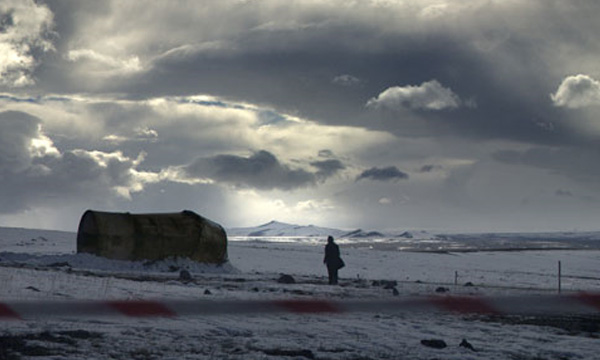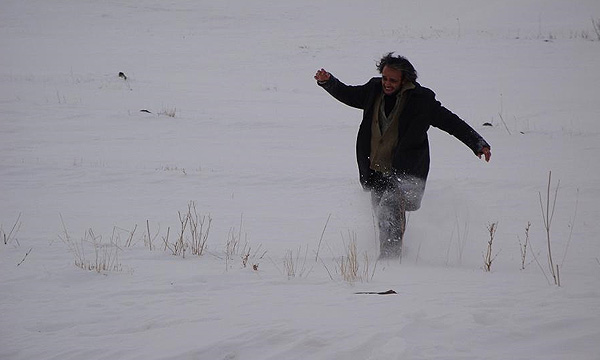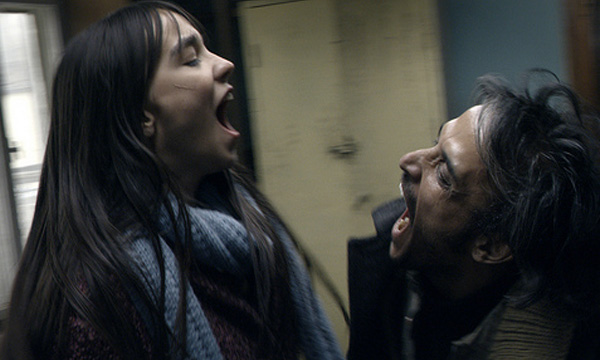One day during the winter a mysterious stranger shows up in a town plagued by endless war. The man, who goes by the name of Battal, saves a boy on the verge of drowning. The boy’s father and his fellow townspeople are grateful to the stranger at first, but after an initial eagerness they become wary of Battal: he is a stranger without past, identity and wish to earn a living. Battal is a riddle in the shape of a man: he’s able to perform bizarre miracles and he speaks of unfathomable truths in the name of God, but he is also unwilling to follow the rules and to merge with others. Unable to meet the expectations of the townspeople and to save them from themselves, Battal is finally forced to move on.
I have to admit I am not familiar with Reha Erdem’s previous films, so I approached Kosmos without any special anticipation. And for two hours I forgot about everything else. Kosmos is a magical film and a unique cinematic experience. If you accept the surreal quality of it, that is. Take into account the fact you don’t, and you can’t, analyze everything and catch every detail. Like it happens with dreams, what you get is an impression, not a coherent story with every single piece falling into place.
Kosmos is a highly symbolic film. Images follow one another in sequences. Animals, abandoned buildings, the sound of a mysterious enemy attacking the town in the distance. The corruption only exists outside the borders, the inhabitants think, but is it really so? Isn’t the enemy something we bring in ourselves? Shots of the urban areas in ruins seem to resonate with the characters’ hopes and intentions. Or with the lack of them. Their secret greed, their turbid desires. The nature of the characters itself has the quality of something inherited from morbid dreams: the brothers carrying around a coffin with their father’s body in it, the lame woman frantically looking for medication, the mute boy staring at planes from the bridge, the teacher ashamed by her physical nature, the tailor affected by chronic asthma. Neptün, the girl that speaks in the language of the birds and Battal, who calls himself Kosmos, a prophet uttering cryptic words and looting shops.



The prophet in Erdem’s film is alone. He’s initially well received by his fellow men, but he’s ultimately rejected by them. Because men are expecting miracles from him, because he is unable to meet their material needs, because he understands them better than they understand themselves and he alone can weep or rejoice for them. Because spirituality goes beyond every day’s expectations.
The scenes are composed beautifully, the cinematography is glorious, the use of the sound – and of the fantastic soundtrack by A Silver Mount Zion – is not simply functional to the action, but it is actually an active element of its own, a character contributing to the mood of the vision Erdem offers to the spectator. Battal runs in the snow and we admire the wastelands covered in snow and the gloomy colors of the river in winter. We see trees shattered by the wind. We can perceive the cold, but just as we can feel it in our dreams. The impression of the cold erodes our senses only through its impression, through the atmosphere it suggests. We get to know the metaphysical town with its blinded windows and its desert houses. We follow Battal as he wanders or lays on frozen ground. We observe human figures as they are silently absorbed in themselves or as they move about the streets. We hear the echo of the bombing as a menacing presence in the distance and the cry of the birds coming from the barren trees. We are drawn in, we become observers and part of the scenery.
Many young filmmakers think it doesn’t take much to make a film. Kosmos reminded me, in the course of the RIFF, that being a filmmaker doesn’t only mean placing a camera in front of a subject and pressing a button. It means composing, it means creating, it means envisioning. Kosmos is a beautiful visual journey through man’s soul, and it’s the result of a skill that is not only sterile technicality.
I am usually suspicious both of those that feel they need to resort to overabundant diegetic explanations to make sure their point is truly getting across and of those who are obsessively making use of abstruse complications or extreme stylization to hide a shite piece of cinema behind the label of art. Some films are like visions or dreams and they don’t necessarily follow rules of consequentiality. Kosmos is one of these visions.
Title: Kosmos
Year: 2009
Director: Reha Erdem
Genre: Drama
Country: Turkey
Runtime: 122 minutes
Language: Turkish
1 thought on “RIFF Day 5 – Kosmos by Reha Erdem”
Comments are closed.